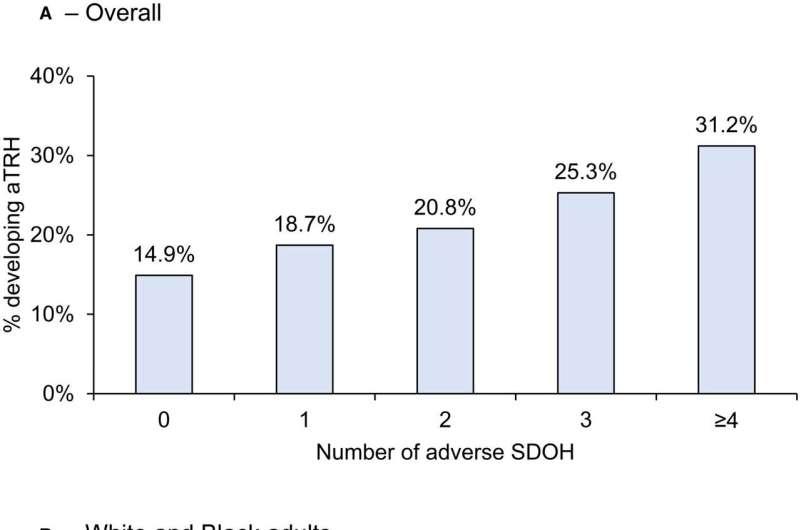This article has been reviewed according to Science X's editorial process and policies. Editors have highlighted the following attributes while ensuring the content's credibility:
fact-checked
peer-reviewed publication
trusted source
proofread
Adverse social determinants of health linked to treatment-resistant hypertension in Black Americans

People were more likely to develop a type of treatment-resistant hypertension when they experienced adverse effects of economic and social conditions that influence individual and group differences in health status, known as social determinants of health.
Additionally, this risk was higher among Black American adults than white American adults, according to a study published in the Journal of the American Heart Association.
Factors linked to this increased risk included having less than a high school education; a household income less than $35,000; not seeing a friend or relative in the past month; not having someone to care for them if ill or disabled; lack of health insurance; living in a disadvantaged neighborhood; and living in a state with low public health infrastructure.
Apparent treatment-resistant hypertension is defined as the need to take three or more types of anti-high blood pressure medication daily and is associated with an increased risk for stroke, coronary heart disease, heart failure, and all-cause mortality.
Over a period of 9.5 years 24% of Black adults developed the condition compared with 15.9% of white adults. Exposure to adverse social determinants of health increased the risk in both Black and white adults, however, Black adults are more likely to face adverse social determinants of health.
According to the researchers, addressing social determinants of health could reduce the racial disparities seen in apparent treatment-resistant hypertension and reduce the increased risk of stroke and heart attack in the Black American population.
For this study, scientists examined data on 2,257 Black and 2,774 white adults, who are part of a larger study that includes more than 30,000 Americans, of whom approximately half live in the "Stroke Belt" in the southeastern United States where the rate of stroke mortality is higher compared to the rest of the country.
The NINDS Office of Global Health and Health Disparities is developing strategies to advance health equity at the institute. In August 2023, a supplement of 10 manuscripts were published, including recommendations for addressing SDOH.
Launched in 2016, the NINDS's Mind Your Risks campaign highlights the link between high blood pressure and dementia, particularly among Black men ages 28–45 and provides strategies for preventing and mitigating the effect of high blood pressure on brain and cardiovascular health.
More information: Oluwasegun P. Akinyelure et al, Social Determinants of Health and Incident Apparent Treatment‐Resistant Hypertension Among White and Black US Adults: The REGARDS Study, Journal of the American Heart Association (2024). DOI: 10.1161/JAHA.123.031695





















